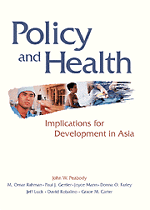Book contents
- Frontmatter
- Foreword
- Preface
- Contents
- Tables
- Figures
- Boxes
- Chapter One OVERVIEW: THE ROLE AND RESPONSIBILITY OF GOVERNMENTS IN THE HEALTH SECTOR
- Chapter Two EVIDENCE-BASED POLICY: USING DATA TO INFORM POLICY AND IMPROVE HEALTH OUTCOMES
- Chapter Three PRIORITIZING MEDICAL INTERVENTIONS: DEFINING BURDEN OF DISEASE AND COST-EFFECTIVE INTERVENTIONS IN THE PURSUIT OF UNIVERSAL PRIMARY CARE
- Chapter Four FINANCING AND ALLOCATING PUBLIC EXPENDITURES: LEVERAGING PUBLIC RESOURCES TO MEET OBJECTIVES AND INCREASE PRIVATE PARTICIPATION
- Chapter Five TOWARD BETTER EQUITY AND ACCESS: PERSISTENT POVERTY, INADEQUATE INTERVENTIONS, AND THE NEED FOR BETTER DATA AND SOLUTIONS
- Chapter Six GOVERNMENT AND THE IMPROVEMENT OF HEALTH BEHAVIORS
- Chapter Seven IMPLEMENTING POLICY OBJECTIVES: THE ROLE AND RESPONSIBILITIES OF THE MINISTRY OF HEALTH
- Acronyms
- Data Notes and Glossary—Chapter Two
- References
- Authors
- Index
- Plate section
Preface
Published online by Cambridge University Press: 18 December 2009
- Frontmatter
- Foreword
- Preface
- Contents
- Tables
- Figures
- Boxes
- Chapter One OVERVIEW: THE ROLE AND RESPONSIBILITY OF GOVERNMENTS IN THE HEALTH SECTOR
- Chapter Two EVIDENCE-BASED POLICY: USING DATA TO INFORM POLICY AND IMPROVE HEALTH OUTCOMES
- Chapter Three PRIORITIZING MEDICAL INTERVENTIONS: DEFINING BURDEN OF DISEASE AND COST-EFFECTIVE INTERVENTIONS IN THE PURSUIT OF UNIVERSAL PRIMARY CARE
- Chapter Four FINANCING AND ALLOCATING PUBLIC EXPENDITURES: LEVERAGING PUBLIC RESOURCES TO MEET OBJECTIVES AND INCREASE PRIVATE PARTICIPATION
- Chapter Five TOWARD BETTER EQUITY AND ACCESS: PERSISTENT POVERTY, INADEQUATE INTERVENTIONS, AND THE NEED FOR BETTER DATA AND SOLUTIONS
- Chapter Six GOVERNMENT AND THE IMPROVEMENT OF HEALTH BEHAVIORS
- Chapter Seven IMPLEMENTING POLICY OBJECTIVES: THE ROLE AND RESPONSIBILITIES OF THE MINISTRY OF HEALTH
- Acronyms
- Data Notes and Glossary—Chapter Two
- References
- Authors
- Index
- Plate section
Summary
For almost two decades, the economy of Thailand grew at an average rate of 11.5 percent a year, but in July 1997 a simmering financial crisis resulted in the forced depreciation of the Thai baht. The crisis soon spread, and by the beginning of 1999, Indonesia, Korea, and Malaysia had experienced two consecutive years of negative economic growth for the first time in 30 years. Equity and real estate markets, which had boomed with the surfeit of domestic and foreign capital, suddenly collapsed under the weight of rising current account deficits and poorly regulated financial intermediaries. The financial contagion also spread to the Philippines, where the peso fell 39 percent, and to the more established economies of Hong Kong and Singapore. Other parts of the world, particularly Latin America and the transition economies of Eastern Europe, have also been severely affected by the crisis.
The crisis in Asia risks undermining one of the most remarkable economic and social achievements in modern history. Absolute poverty had been nearly eliminated in Korea, Malaysia, and Thailand. In 1975, six out of ten East Asians lived on less than a dollar a day; by 1995, this figure was down to roughly two out of ten. Although the precise figure is not known, tens of millions have been dragged back down into poverty by the crisis. For example, by the end of 1998, Thailand had 800,000 newly unemployed workers, and in Indonesia, the figure was a staggering 20 million people.
- Type
- Chapter
- Information
- Policy and HealthImplications for Development in Asia, pp. vii - xPublisher: Cambridge University PressPrint publication year: 1999



